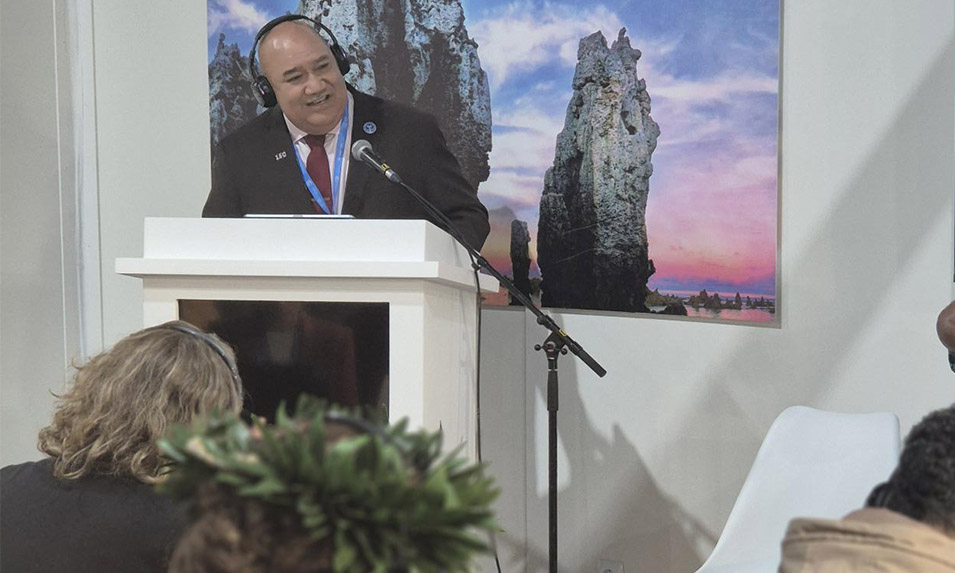
“Investing in climate-resilient health facilities is not a luxury. It is a lifeline,” Dr Saia Ma’u Piukala warned in Baku, Azerbaijan. “We urgently need accessible and equitable climate-health financing for the Pacific. Current funding is simply insufficient to meet the unique needs of these Small Island Developing States. I am here at COP29 to help change that.”
Dr Piukala delivered the keynote speech in a side event at COP29’s Moana Blue Pacific Pavilion on Friday.
The World Health Organization (WHO) Regional Director for the Western Pacific, Dr Piukala, and other high-level UN and government officials are at the 29th Conference of the Parties to the UN Framework Convention on Climate Change (COP29) in Baku, calling for financial commitments and urgent actions to improve health facilities’ resilience to climate change. The WHO Western Pacific Region includes 37 countries and areas, including large Asian countries and small Pacific islands that are particularly vulnerable to climate change.
Across the Western Pacific Region, rising sea levels, extreme weather events and environmental degradation pose serious risks to health infrastructure and community well-being. The toll of climate inaction is striking – an estimated 3.5 million lives are lost each year to environmental causes in the Western Pacific Region alone, WHO reported.
Health facilities across the Western Pacific Region – especially in low-lying Pacific communities scattered across more than 10 000 islands including Kiribati, Marshall Islands and Tuvalu – face health risks from rising seas and increasingly frequent extreme weather events such as tropical cyclones. A recent study of hospitals in 14 Pacific island countries found that 62% are located within 500 metres of the coast or a river, leaving them vulnerable to inundation. According to a recent UN report, sea levels in the Pacific are projected to rise to levels 10–30% higher than the global average. In addition to coastal flooding, rising sea levels also threaten food security and population mental health.
Calling for a health facilities funding lifeline, Dr Piukala presented the recently endorsed five-year regional vision for WHO’s work with governments and partners, Weaving Health for Families, Communities and Societies in the Western Pacific Region. It prioritizes climate-resilient health systems, focusing on the capacity to anticipate, prepare for and respond to climate-related health risks while embracing sustainable practices and green technologies. This approach goes beyond physical infrastructure; it involves strengthening early warning systems for infectious disease outbreaks, selecting technology best suited to local contexts, and ensuring health services remain accessible and functioning during all phases of emergencies.
Dr Piukala explained that “the vision draws inspiration from the tradition of weaving − a shared practice across the Region. “Just as individual strands are woven together to create a mat that is strong and resilient, our collective determination and actions can build a health system that is strong enough to withstand the challenges climate change throws at us,” he said.
During the event, Dr Piukala was also joined by regional partners including Mr Sefanaia Nawadra, Director General of the South Pacific Regional Environment Programme (SPREP); Ms Karen Mapasua, Director of the Land Resources at the Pacific Community (SPC); as well as Pacific ministers and youth champions. Together they discussed the Region’s climate vulnerabilities and the importance of youth-led actions for a sustainable future.
“No one will invite you into the climate change space, it is our common space. Health Ministers and leaders need to guide us in what health and climate means for the Pacific,” said Mr Nawadra.
In her concluding remarks, Ms Mapasua said: “What this really takes is partnerships and critical relationships to ensure that the weave on our mat is tight.”
Throughout COP29, the WHO Western Pacific Region delegation headed by Dr Piukala will lead and take part in key discussions focused on enhancing climate resilience in urban areas and islands with particular vulnerabilities.
On 19 November, Dr Piukala will participate in a full-day session on the Alliance for Transformative Action on Climate and Health (ATACH), which is currently uniting 85 countries to advance climate-resilient health systems globally.
Over 40 000 delegates – including world leaders, United Nations (UN) officials, climate experts, journalists, representatives from nongovernmental organizations and youth advocates – have gathered at COP29 last week. Together, they are evaluating progress and tackling urgent climate challenges projected to cause 14.5 million additional deaths and US$ 1.1 trillion in extra costs to health-care systems.
With a strong focus on climate finance, COP29, known as the “Finance COP”, aims to secure greater financial commitments – including in global health – to aid communities at risk from vulnerabilities.



